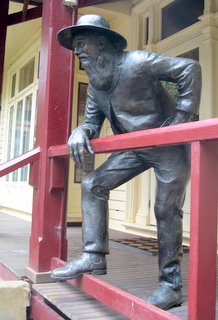Related Research Articles

Andrew Barton "Banjo" Paterson, was an Australian bush poet, journalist and author. He wrote many ballads and poems about Australian life, focusing particularly on the rural and outback areas, including the district around Binalong, New South Wales, where he spent much of his childhood. Paterson's more notable poems include "Clancy of the Overflow" (1889), "The Man from Snowy River" (1890) and "Waltzing Matilda" (1895), regarded widely as Australia's unofficial national anthem.

"The Man From Ironbark" is a poem by Australian bush poet Banjo Paterson. It is written in the iambic heptameter.

The Man from Snowy River is a 1982 Australian Western drama film based on the Banjo Paterson poem "The Man from Snowy River". The film had a cast including Kirk Douglas in a dual role as the brothers Harrison and Spur, Jack Thompson as Clancy, Tom Burlinson as Jim Craig, Sigrid Thornton as Harrison's daughter Jessica, Terence Donovan as Jim's father Henry Craig, and Chris Haywood as Curly. Both Burlinson and Thornton later reprised their roles in the 1988 sequel, The Man from Snowy River II. The 1988 sequel film was later released in the United States by Walt Disney Pictures under the title Return to Snowy River and in the United Kingdom under the title The Untamed.
Up The Country is a popular poem by iconic Australian writer and poet Henry Lawson. It was first published in The Bulletin magazine on 9 July 1892, under the title Borderland, and started the Bulletin Debate, a series of poems by both Lawson and Andrew Barton "Banjo" Paterson about the true nature of life in the Australian bush.
In Defence of the Bush is a popular poem by Australian writer and poet Andrew Barton "Banjo" Paterson. It was first published in The Bulletin magazine on 23 July 1892 in reply to fellow poet Henry Lawson's poem, Up The Country. Paterson's rebuttal sparked the Bulletin Debate, a series of poems by both Lawson and Paterson about the true nature of life in the Australian bush.
The City Bushman is a poem by iconic Australian writer and poet Henry Lawson. It was first published in The Bulletin magazine on 6 August 1892, under the title In Answer to "Banjo", and Otherwise. It was the fourth work in the Bulletin Debate, a series of poems by both Lawson and Andrew Barton "Banjo" Paterson, and others, about the true nature of life in the Australian bush.

Clement Semmler OBE, AM, often referred to as Clem Semmler, was an Australian author, literary critic, broadcaster and radio and television executive.
This article presents a list of the historical events and publications of Australian literature during 1905.
This article presents a list of the historical events and publications of Australian literature during 1892.
This article presents a list of the historical events and publications of Australian literature during 1891.
"Bell-Birds" is a poem by Australian writer Henry Kendall that was first published in The Sydney Morning Herald on 25 November 1867.
The Poets of the Tomb is a poem by Australian writer and poet Henry Lawson. It was first published in The Bulletin magazine on 8 October 1892 in reply to fellow poet Andrew Barton "Banjo" Paterson's poem, In Answer to Various Bards.
Saltbush Bill, J.P. is a humorous poem by Australian writer and poet Andrew Barton "Banjo" Paterson. It was first published in The Evening News on 16 December 1905.
A Bush Christening is a humorous poem by Australian writer and poet Andrew Barton "Banjo" Paterson. It was first published in The Bulletin magazine on 16 December 1893, the Christmas issue of that publication. It has been called "a rollicking account of how the traditional pre-occupations, whisky and religion, come together".

Saltbush Bill, J.P., and Other Verses (1917) is the third collection of poems by Australian poet Banjo Paterson. It was released in hardback by Angus and Robertson in 1917, and features the poems "Waltzing Matilda", "Saltbush Bill, J.P.", "An Answer to Various Bards" and "T.Y.S.O.N.".
This article presents a list of the historical events and publications of Australian literature during 1953.
This article presents a list of the historical events and publications of Australian literature during 1957.
This article presents a list of the historical events and publications of Australian literature during 1967.
Three Elephant Power and Other Stories (1917) is a collection of short stories by the Australian writer Banjo Paterson.
"A Bushman's Song" (1892) is a poem by Australian poet A. B. Paterson.
References
- 1 2 3 "Austlit — "The Cast-Iron Canvasser" by Banjo Paterson". Austlit. Retrieved 29 August 2023.
- ↑ ""New Fiction"". The Sydney Morning Herald, 27 October 1917, p6. Retrieved 29 August 2023.
- ↑ ""Paterson's works are still as fresh as hot bread"". The Canberra Times, 7 January 1984, p13. Retrieved 29 August 2023.